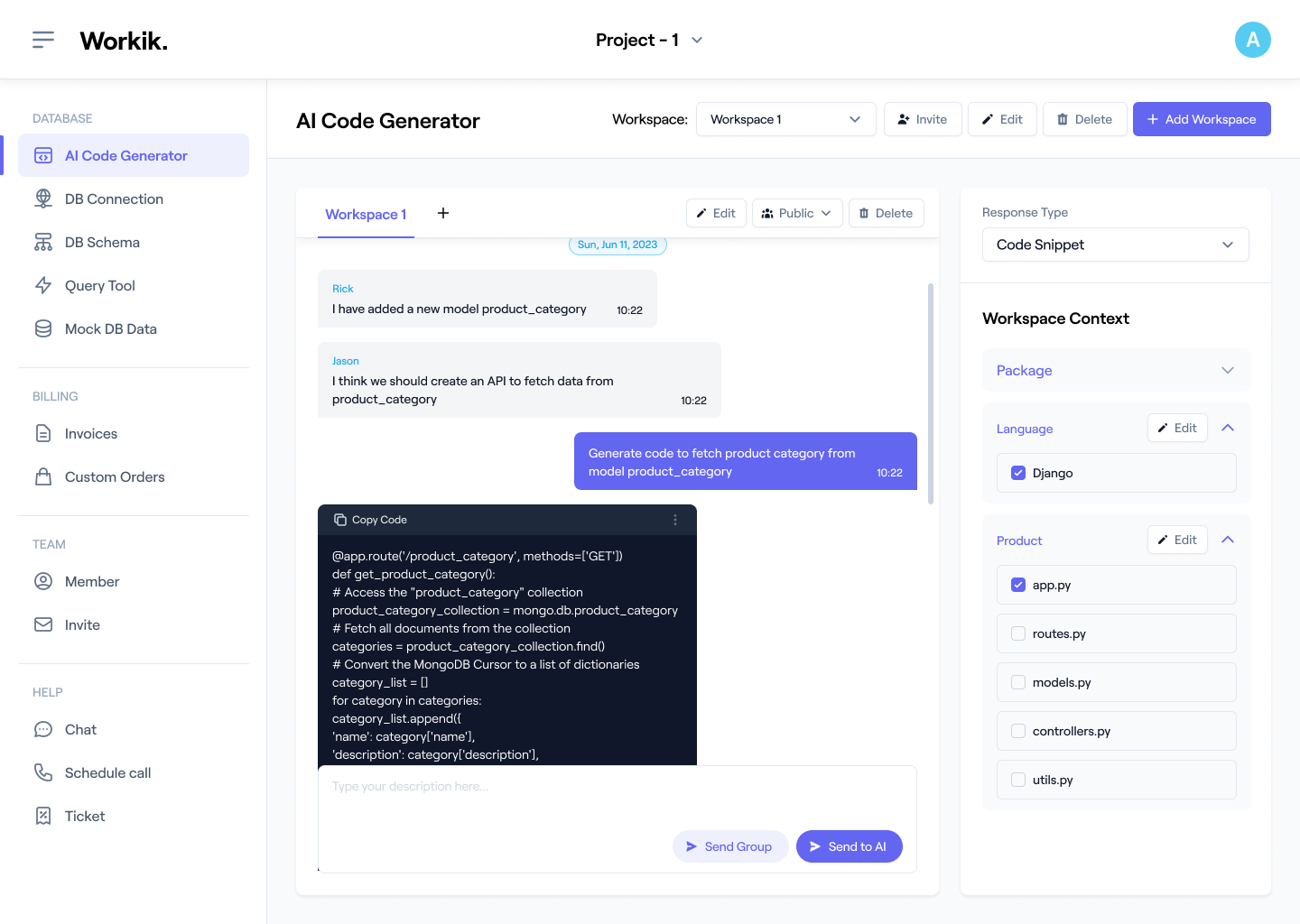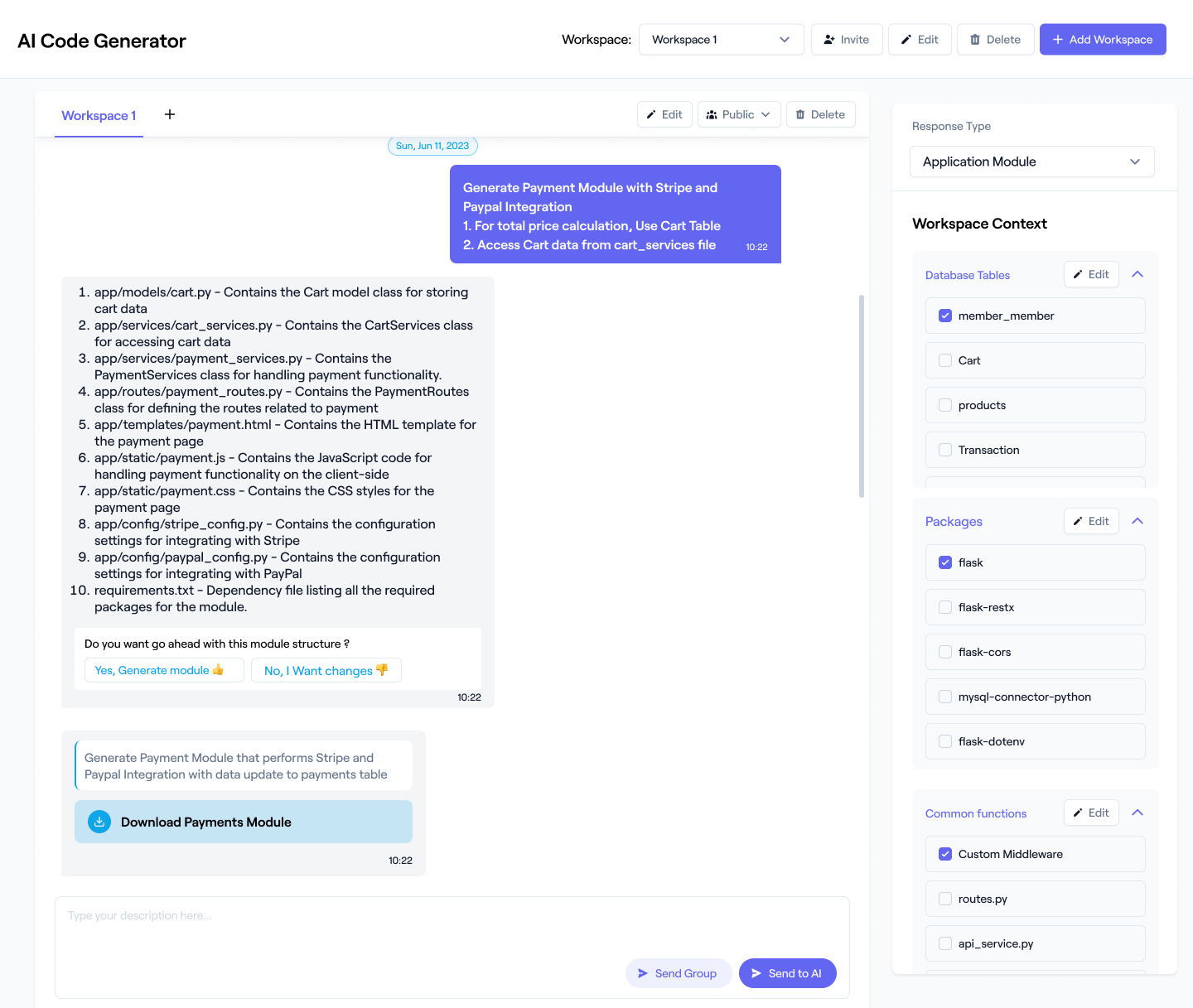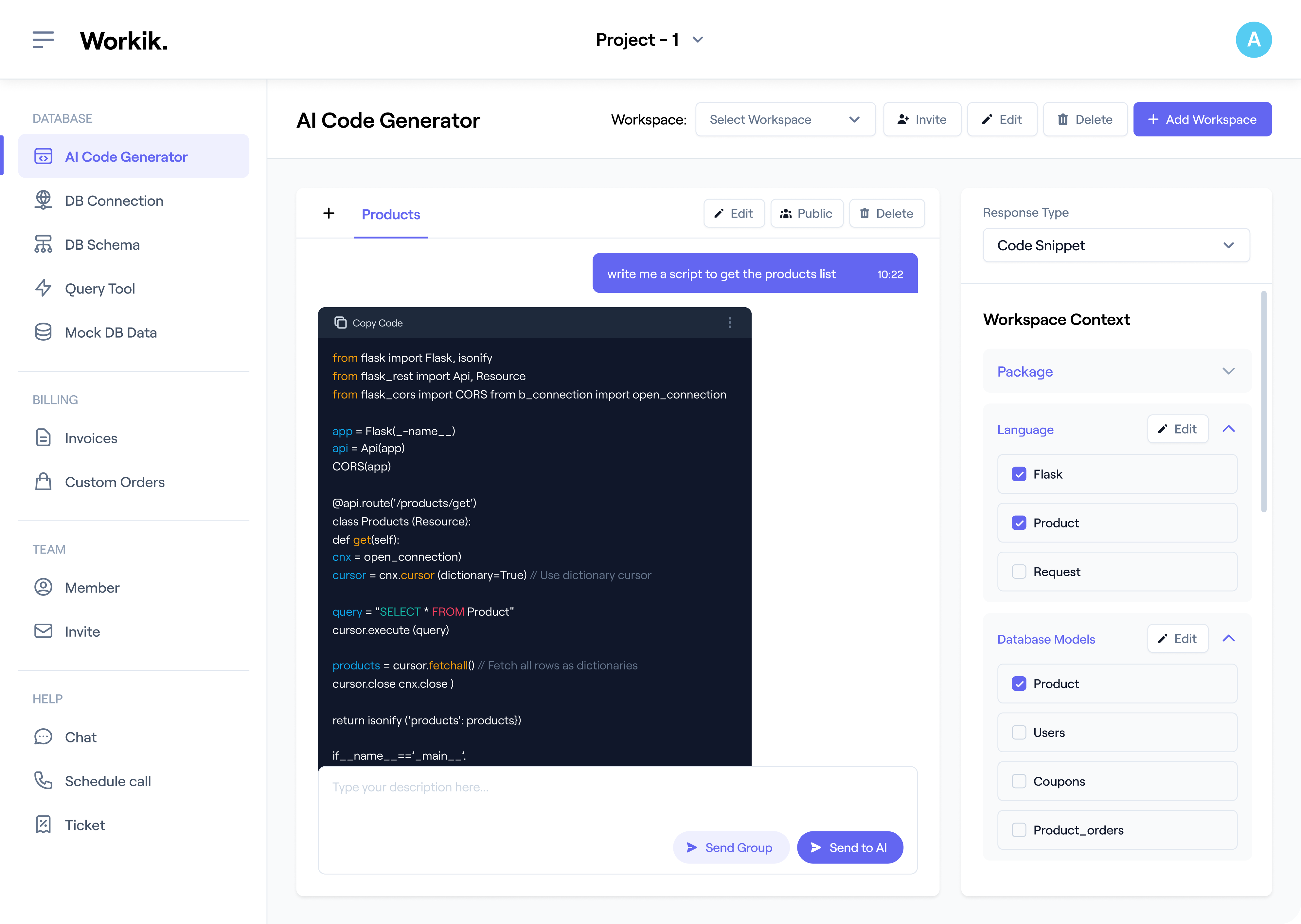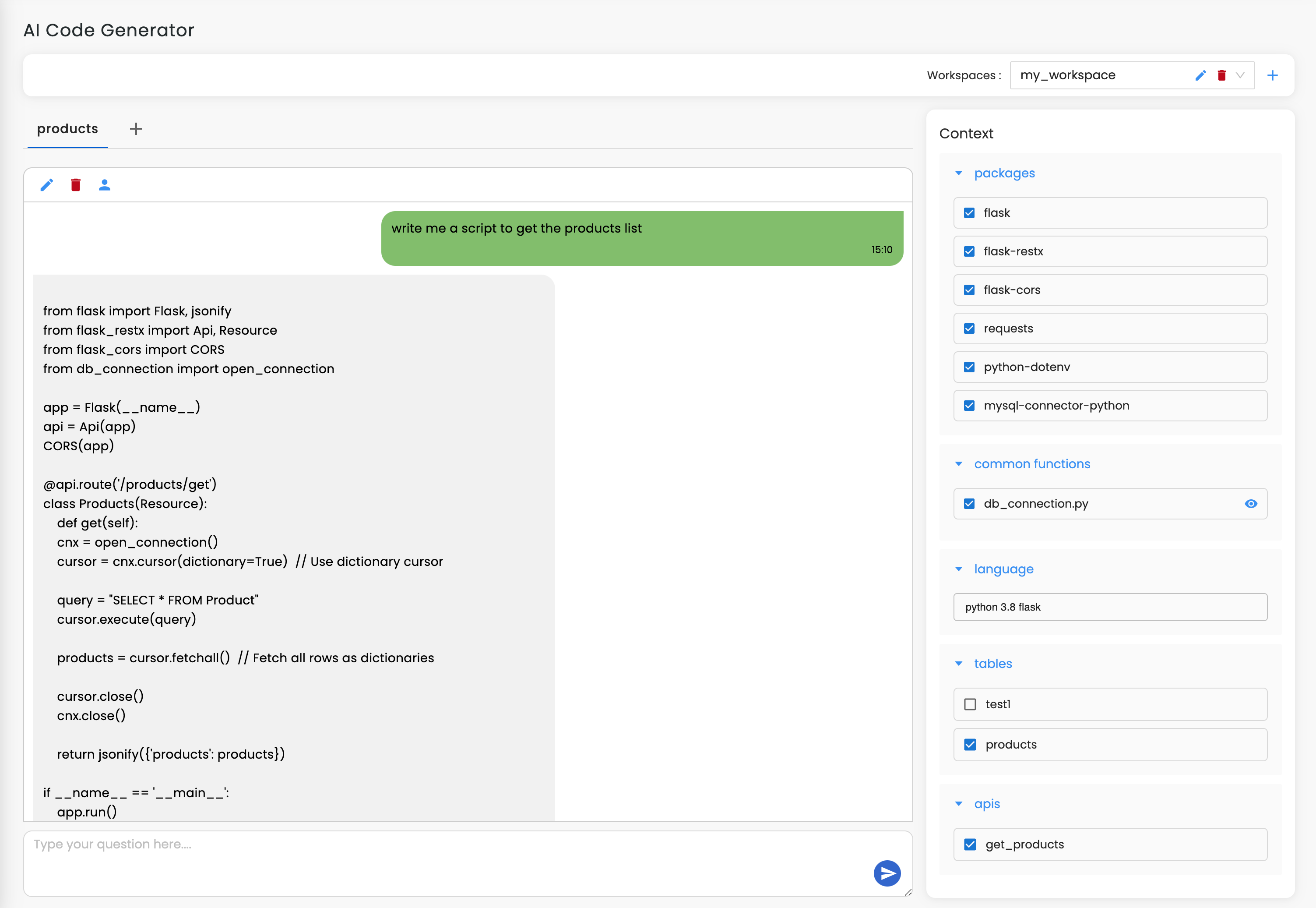
Join our community to see how developers are using Workik AI everyday.
Features

Generate Prolog Code
AI generates Prolog code for expert systems, AI models, and complex logic tasks by defining rules, facts, and queries effortlessly.

Debug with AI
AI identifies and resolves recursion and backtracking issues, optimizing Prolog code performance for smoother execution.

Simplify Prolog Queries
Complex Prolog queries are created with ease using AI, improving data retrieval and enhancing problem-solving in logic systems.

Manage Knowledge Bases
AI manages Prolog knowledge bases, enabling efficient reasoning for tasks like NLP, expert systems, and theorem proving.
How it works
Sign up quickly with Google or manually to access Workik’s AI-powered Prolog development tools.
Connect GitHub, GitLab, or Bitbucket. Define Prolog-specific elements like SWI-Prolog or GNU Prolog libraries, custom rule sets, knowledge bases & more. AI adapts to your logic setup for precise code generation.
Input your rules and queries, and let AI generate Prolog code for expert systems or AI models. AI can assist you in any task required.
Invite your team to shared workspaces. Assign tasks and use AI insights to refine logic, manage knowledge bases, and optimize your Prolog projects.


Expand


Expand


Expand


Expand


Expand


Expand


Expand


TESTIMONIALS
Real Stories, Real Results with Workik
Prolog development is a breeze with Workik. AI handles logic and recursion seamlessly.

Lana Lee
Software Developer
Workik’s AI simplified Prolog code generation and documentation for my NLP project.

Victoria Rodger
NLP Specialist
As a Prolog beginner, Workik’s AI helped me generate and debug code fast!

Allen Steel
Junior Developer
What are some popular use cases of Workik's AI-powered Prolog Code Generator?


Some popular use cases of the Prolog Code Generator include but are not limited to:
* Developing expert systems for decision-making in healthcare, legal, and AI-driven applications.
* Building knowledge-based systems for automated reasoning and problem-solving.
* Implementing NLP logic for parsing, text generation, or language understanding.
* Solving constraint satisfaction problems like scheduling and optimization.
* Automating theorem proving and logical deductions in research and academics.
* Creating rule-based systems for AI diagnostics and recommendation engines.
What context-setting options are available in Workik’s AI for Prolog Code Generator?


Workik offers diverse context-setting options for Prolog code assistance, allowing users to:
* Specify SWI-Prolog or GNU Prolog libraries for tailored logic generation.
* Add knowledge bases and custom rule sets for specific tasks.
* Import Prolog predicates and facts from GitHub, GitLab, or Bitbucket.
* Use CLP contexts for optimization and scheduling problems.
* Define query structures for recursive reasoning and backtracking.
* Integrate with databases and APIs to handle complex logic operations.
How does Workik manage Prolog knowledge bases?


Workik’s AI organizes and scales Prolog knowledge bases, ensuring rules, facts, and queries are seamlessly integrated. This allows for the smooth growth of logic systems like medical diagnosis platforms, without compromising performance.
Can Workik handle constraint logic programming (CLP)?


Yes, Workik supports CLP, making it ideal for optimization tasks like scheduling and resource allocation, efficiently handling constraints in Prolog.
How does Workik handle documentation for Prolog?


Workik automatically generates documentation for Prolog code, detailing rules, facts, queries, and recursion flows, making projects easier to maintain and scale.
How does Workik help scale Prolog systems?


Workik’s AI ensures that as your Prolog system grows, whether it’s an expert system or a large knowledge-based platform, performance remains optimized. It efficiently manages increasing logic complexity, keeping query execution fast and precise.
Generate Code For Free

Prolog: Question & Answer
Prolog is a logic programming language used for AI, problem-solving, and computational linguistics. It allows developers to define rules, facts, and queries, enabling the system to derive logical conclusions. Prolog is particularly strong in areas requiring pattern matching, automated reasoning, and symbolic computation.
Popular languages, frameworks, and tools used with Prolog include:
Languages:
Prolog, SWI-Prolog, GNU Prolog
Logic Solvers:
CLP (Constraint Logic Programming), ASP (Answer Set Programming)
Development Tools:
SWI-Prolog IDE, VS Code (Prolog extensions), Emacs (Prolog mode)
Database Integration:
ODBC, MySQL, SQLite
Libraries:
Logtalk (object-oriented Prolog), NLP libraries for text parsing and processing
Debugging Tools:
SWI-Prolog graphical tracer, spy points, backtracking visualizers
Popular use cases for Prolog include, but are not limited to:
Expert Systems:
Build decision-making systems for fields like medicine, law, and AI.
Natural Language Processing (NLP):
Parse and understand language structures using Prolog.
Knowledge Representation:
Model complex systems with rules and facts for automated reasoning and theorem proving.
Constraint Satisfaction Problems (CSP):
Solve scheduling, resource allocation, and optimization tasks with CLP.
Theorem Proving:
Automate logical deductions and proofs for research and formal verification.
Game AI:
Develop AI for logic-based games like chess and puzzle-solving.
Career roles in Prolog include AI Developer, Logic Programmer, Knowledge Engineer, NLP Researcher, and Constraint Solver Specialist. These professionals focus on building expert systems, solving constraint problems, automating logical reasoning, and integrating Prolog with AI and NLP tasks.
Workik AI enhances Prolog development by:
Code Generation:
Instantly generate Prolog code for expert systems and constraint satisfaction problems.
Debugging:
Detect and fix recursion and backtracking issues for optimal logic performance.
Optimization:
Improve query execution and reasoning speed with AI-driven optimizations.
Knowledge Base Management:
Automate scaling and integration of large knowledge bases with seamless rule handling.
Documentation:
Auto-generate detailed Prolog documentation, covering rules, facts, and recursion paths.
Integration:
Connect Prolog with databases (ODBC, MySQL) and APIs for complex logic processing.
Refactoring:
Refactor code for better readability and efficiency in logic programming.
Constraint Logic Programming (CLP):
Generate and optimize CLP for tasks like scheduling and resource allocation.
Explore more on Workik
Get in touch
Don't miss any updates of our product.
© Workik Inc. 2026 All rights reserved.

